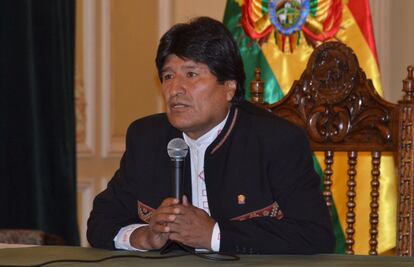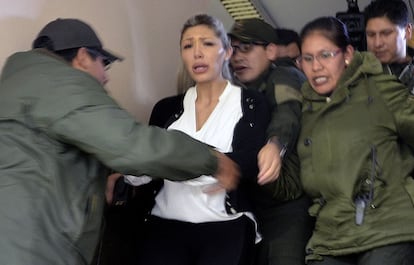Evo Morales: “I’ll keep the child; it’s not a problem”
Son of Bolivian president and government lobbyist apparently not dead, as family had claimed

There has been a new installment in the real-life soap opera currently playing itself out in Bolivia. On Monday, the country’s president, Evo Morales, asked to meet a son that he allegedly fathered, a son he claims to have thought had died in 2007.
“I want to ask the relatives, his aunt, to introduce me, to bring me [the child]. If the family allows it, I’d like to keep him,” he said. According to the government’s side of the story, the mother and the president’s ex-girlfriend, Gabriela Zapata, lied to him about the death of the infant. Zapata, a lobbyist for government contractors, has been accused of conspiring with the opposition.
It’ll be a joy for me. It’s like a blessing if in the end he is alive although I ask myself why they’ve lied to me President Morales
“It’s not a problem for me. If he is alive, it’ll be a joy for me. It’s like a blessing if in the end he is alive although I ask myself why they’ve lied to me, why they kept me away, what interests are there,” Morales told reporters at a press conference. The president stated that Zapata told him the boy had died of an illness in 2007.

Whether the child in question exists or not was an important factor before the February 21 referendum, when Morales denied his existence because if he were alive, his relationship with Zapata, which he admitted to after it was revealed in the press, would not have officially ended. As such, government contracts with Chinese firms on which Zapata worked would have fallen under suspicion, given her relationship with the president. The opposition says Morales lied to protect himself during the plebiscite held to change the law so that he might run for president for the fourth time in 2019. In the end, he lost the referendum, partly because of this controversy.
The family of Zapata announced the existence of the child after she was arrested on allegations of exchanging political favors and misappropriation of funds. Her detention, which was ordered by a government ministry and not the public prosecutor, was based on revelations about her once her relationship with the president became public. It emerged that she had sent letters to officials in charge of making decisions that affected the Chinese companies for which she worked.
The family of Zapata announced the existence of the child after she was arrested on allegations of exchanging political favors and misappropriation of funds
According to the judge, Zapata is being held in custody because she is a flight-risk. TV news coverage showed the 28-year-old crying while being escorted by police officers through a scrum of reporters and photographers as she entered and left the courthouse. Her relatives and lawyers say she is the victim of a political ploy to clear Morales of any wrongdoing and that, though Zapata has a lot to say about the relationship and their son, she is keeping quiet because she has received death threats.
Vice President Álvaro García Linera defended Morales, saying that Zapata’s brothers are militant opposition members, thus suggesting a possible conspiracy against the president. Other representatives of the administration blamed the United States Secret Service. Social media teemed with criticism of Morales, not so much for his alleged lies, but because if what he said was true, it would mean that he had a son with Zapata but did not meet him, take care of him during his illness, or even verify his death. This line of criticism is worse because Morales has three children by three different mothers, and it took him a long time to acknowledge one of them as his own.
English version by Dyane Jean Francois.
Tu suscripción se está usando en otro dispositivo
¿Quieres añadir otro usuario a tu suscripción?
Si continúas leyendo en este dispositivo, no se podrá leer en el otro.
FlechaTu suscripción se está usando en otro dispositivo y solo puedes acceder a EL PAÍS desde un dispositivo a la vez.
Si quieres compartir tu cuenta, cambia tu suscripción a la modalidad Premium, así podrás añadir otro usuario. Cada uno accederá con su propia cuenta de email, lo que os permitirá personalizar vuestra experiencia en EL PAÍS.
¿Tienes una suscripción de empresa? Accede aquí para contratar más cuentas.
En el caso de no saber quién está usando tu cuenta, te recomendamos cambiar tu contraseña aquí.
Si decides continuar compartiendo tu cuenta, este mensaje se mostrará en tu dispositivo y en el de la otra persona que está usando tu cuenta de forma indefinida, afectando a tu experiencia de lectura. Puedes consultar aquí los términos y condiciones de la suscripción digital.








































